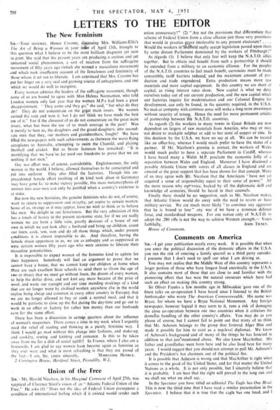LETTERS TO THE EDITOR
The New Feminism
Sta,—Your reviewer, Honor Croome, dassing Mrs. Williams-Ellis's
The Art of Being a Woman in your of April 13th, brought to this question what I believe to be the most brilliant diagnosis yet seen in print. She said that the present years are producing a curious and yet unnamed social phenomenon, a sort of reaction from the suffragette movement of fifty years ago (which she termed a masculinist movement) and which took insufficient account of the femaleness and femininity of those whom it set out to liberate. I am convinced that Mrs. Croome has put her finger on a very real and growing source of unhappiness, and one which we would do well to recognise.
Every woman admires the leaders of the suffragette movement, though some of us are bound to agree with Miss Helena Normanton, who told London women only last year that the women M.P.s had been a great disappointment. "They come and they go," she said, " but what do they do? They do not concentrate on the grfat main issues. We women earned the vote and won it, but I do not think we have made the best use of it." For if the cleverest of us do not concentrate on the great main issues, what has been the use of so much courage in the past? Was it merely to turn us, the daughters and the grand-daughters, into second- rate men that they, our mothers and grandmothers, fought? We have filled the newspapers with such achievements as (between the wars) flying aeroplanes to Australia, attempting to swim the Chanifel, and playing football and cricket. But as Storm Jameson has remarked: " It is mortifying that we have-so far used our freedoms to prove that we are nothing if not men."
Our war effort was, of course, considerable. Englishwomen, the only women in the world. I believe, allowed themselves to be conscripted and put into uniform They also filled the factories. Though this un- precedented female effort (nothing of its kind took place in Germany) may have gone fa: to make victory possible, this mass metamorphosis of women into near-men c.n only be justified when a country's existence is at stake.
But now the new feminists, the genuine feminists who do not, of course, want to return to suppression and atrophy, yet aspire to remain women. Some of us, strange as it may appear, have no wish to think or to behave like men. We delight in our femaleness. But the very admission of this has a touch of heresy in the present economic state, for if we are really women we are born a little vain, greatly desirous of a house of our own in which we can look after a husband and bring up children, count our linen, cook, sew, iron and do all those things which, under present conditions it is almost impossible to do. And therefore, having the female strain uppermost in us. we are as unhappy and as suppressed as were certain women fifty years ago who were anxious to liberate their Masculine potentialities. It is impossible to expect women of the feminine kind to agitate for their happiness. Somebody will find an argument to prove that we cannot haye a house, that we cannot keep our children at home when there are such excellent State schools to send them to (from the age of two or three), that we must go without linen, the dream of every woman, to help the dollar drive, and not knit any more because of the price of wool. and waste our eyesight and our time mending stockings of a kind that are no longer worn by civilised women anywhere else in the world (nylon being cheap and common in every other country in Europe), that we are no longer allowed to buy or cook a normal meal, and that it would be patriotic to close up the flat during the day-time and go out to work in an office or factory for rather less money than our husbands earn for the same effort.
There has been a discussion in certain quarters about the influence of women's magazines. There comes a time in my week when I urgently need the relief of reading and thinking in a purely feminine way. I think I would go mad without this plunge into fashions, and make-up, and cookery. sewing and knitting and romance. Is this to be taken away from me for a dish of social uplift? In France. where I also am a housewife. I am glad to say women have become again as feminine as they ever were and what is most refreshing is that they are proud of


































 Previous page
Previous page